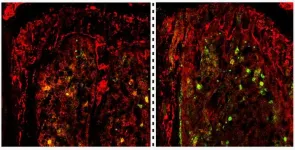(Press-News.org) In trials, the antipsychotic drug brexpiprazole (Rexulti) failed to provide a clinically meaningful benefit and increased the risk of death. Yet the US Food and Drug Administration (FDA) has fast tracked its approval, making Rexulti the first antipsychotic for treating agitation in elderly patients with dementia.
At a cost of around $1,400 a month Rexulti’s makers, Otsuka and Lundbeck, are forecasting an additional $1 billion in annual sales, but there are serious questions about the harm-benefit balance of this drug, writes investigative journalist Robert Whitaker in The BMJ today.
The decision may also reverse years of effort by the US Centers for Medicare and Medicaid Services (CMS) to reduce the widespread off-label use of antipsychotics in residential care homes.
Like other antipsychotics, the drug carries a “boxed warning,” FDA’s most serious type of warning, informing prescribers of increased risk of death. And in the three pre-approval trials, the FDA concluded that the death rate was four times higher in those given brexpiprazole compared to those given placebo.
On efficacy, the drug showed a maximum 5.3-point improvement over placebo on a 174-point scale, far short of the 17 points considered to be clinically important.
“The small benefits do not outweigh serious safety concerns,” Public Citizen health researcher Nina Zeldes told the FDA’s Advisory Committee prior to the approval. “Like other antipsychotics, this is a drug that can kill patients without providing a meaningful benefit.”
Professor Lon Schneider at the Keck School of Medicine of the University of Southern California noted that the brexpiprazole outcomes mirrored the results from earlier trials of antipsychotics in Alzheimer’s patients, yet none of these other antipsychotics has been approved for treating behavioural symptoms in elderly patients with dementia.
Schneider says the FDA has a “lower standard of approval” today than it did 20 years ago, a theme echoed by Zeldes, who said: “We are very disappointed that the FDA approved this additional label indication for brexpiprazole on such weak data. The FDA has set a dangerous precedent about the data it may require for future drug approvals for this vulnerable patient group.”
In a vote, nine of the FDA committee’s 10 members believed there was sufficient data to identify a population in whom benefits outweighed the drug’s risks. But even among those voting yes, several advisors expressed concern about its use in patients with mild symptoms. Some stressed the need for individualised risk-benefit evaluation in collaboration with patients’ families.
The chair of the advisory committee, Rajesh Narendran, did not respond to multiple requests for an interview to answer questions raised by this approval, while a spokesperson for the FDA’s Center for Drug Evaluation and Research stated that “due to conflicting schedules and competing priorities,” the FDA would be unable to respond.
Whitaker notes that a number of patient advocacy groups, such as the Alliance for Aging Research, Leaders Engage on Alzheimer’s Research (LEAD), and Us Against Alzheimer’s, urged the FDA to approve brexpiprazole.
This public support is fuelled, in part, by commercial interests, he writes.
LEAD, for instance, is a “coalition of more than 200 organizations” that includes, among its members, Otsuka and other pharmaceutical companies, while the Alliance for Aging Research, which lists 31 partners, receives funding from Otsuka and other pharmaceutical companies for “non-branded health education and advocacy on neuropsychiatric symptoms of dementia.”
Erick Turner, a former FDA reviewer and professor of psychiatry at Oregon Health & Science University, said that clinicians’ responses to the approval will likely vary according to their current beliefs about prescribing antipsychotics to Alzheimer’s patients.
He added: “On the topic of marketing, I do think it will come down to KOLs [key opinion leaders] and drug reps ‘educating’ clinicians.”
Whitaker writes that if Otsuka’s presentation to the drug advisory committee is any guide, the talking point it will use to market brexpiprazole is that it is much safer than other antipsychotics, even though that favourable safety comparison was built into Otsuka’s design of phase III trials.
Such marketing efforts will likely be at odds with ongoing efforts by the CMS. “Antipsychotic medications are especially dangerous among the nursing home population because of their potentially devastating side effects, including death,” a CMS spokesperson said. “We cannot speak to the hypothetical future use of brexpiprazole; however, CMS will continue its efforts to reduce the prescribing of unnecessary antipsychotics in nursing homes.”
END
Alarm as FDA fast-tracks first antipsychotic drug for agitation in dementia
Investigation raises serious questions about the harm-benefit balance of Rexulti; Decision may reverse efforts to reduce use of antipsychotics in US care homes
2023-08-18
ELSE PRESS RELEASES FROM THIS DATE:
UArizona College of Nursing receives $2.6M HRSA grant to support Doctor of Nursing Practice students' clinical placements
2023-08-18
The University of Arizona College of Nursing was one of 50 institutions nationwide to receive a Health Resources and Services Administration grant to increase the number and diversity of Doctor of Nursing Practice students in clinical rotations at Federally Qualified Health Center partners in southern Arizona.
The project will use the $2.6 million in funding from the HRSA’s Advanced Nursing Education Workforce Program to deploy immersive managed practice adaptable clinical training, or IMPACT, starting in the spring semester of 2024.
The grant will support students pursuing doctorates in the specialty areas ...
Blue-light filtering spectacles probably make no difference to eye strain, eye health or sleep quality
2023-08-18
Spectacles that are marketed to filter out blue light probably make no difference to eye strain caused by computer use or to sleep quality, according to a review of 17 randomised controlled trials of the best available evidence so far.
Nor did the review find any evidence that blue-light filtering lenses protect against damage to the retina, the light-sensitive tissue at the back of the eye, as included studies did not evaluate this outcome. Blue-light filtering lenses, also known as blue-light blocking spectacles, have been increasingly prescribed or recommended, often by optometrists, ...
Demon Hunting: Physicists confirm 67-year-old prediction of massless, neutral composite particle
2023-08-18
In 1956, theoretical physicist David Pines predicted that electrons in a solid can do something strange. While they normally have a mass and an electric charge, Pines asserted that they can combine to form a composite particle that is massless, neutral, and does not interact with light. He called this particle a “demon.” Since then, it has been speculated to play an important role in the behaviors of a wide variety of metals. Unfortunately, the same properties that make it interesting have allowed it to elude detection since its prediction.
Now, a team of researchers led by Peter Abbamonte, a professor of physics at the University of Illinois Urbana-Champaign, ...
Stanford Medicine-led research identifies gene ‘fingerprint’ for brain aging
2023-08-18
Most of us who’ve reached middle age have noticed a slowing in memory and cognition, but scientists don’t have a clear picture of the molecular changes that take place in the brain to cause it.
Now, a study in mice has determined that the most pronounced changes occur in the white matter, a type of nervous system tissue that’s integral to transmitting signals across the brain. The study also examined two treatments — caloric restriction and infusions of plasma from young mice — that affect certain regions of the brain, with ...
Study observes sudden acceleration of flow, generates new boundary layer
2023-08-18
In an experiment on how turbulent boundary layers respond to acceleration in the flow around them, aerospace engineers at the University of Illinois Urbana-Champaign observed an unexpected internal boundary layer.
“Not only were we able to identify a new internal boundary layer, but we were able to systematically track its height so we can understand its growth rate. We also noticed that it only formed if our pressure grading, our acceleration, was sufficiently strong. There was a threshold under which we didn't ...
Being divorced and male among factors that increase risk of lower limb amputation among people with diabetes
2023-08-18
New research to be presented at this year’s Annual Meeting of the European Association for the Study of Diabetes (EASD) in Hamburg, Germany (2-6 October) shows that among people with type 1 and type 2 diabetes, being divorced is associated with a two-thirds higher risk of lower limb amputation (LLA) (amputations below the knee level) compared with being married, and being male is associated with a 57% higher risk of LLA compared with being female. The study is by Dr Stefan Jansson, Örebro University, Örebro, Sweden, and colleagues.
Deterioration in the structure of both large and ...
Researchers find walkable communities are healthier for both mom and baby
2023-08-17
DURHAM, N.H. — Pregnant women that live in walkable communities—with more sidewalks, parks and walking paths—not only engage in more physical activity but are also more likely to experience favorable birth outcomes, according to research from the University of New Hampshire.
The study, published in the journal of Economics and Human Biology, found that expectant mothers living in walkable counties tend to engage in more walking and exercise and have fewer issues with premature births, low birth weight, gestational diabetes and hypertension. Walking is often recommended as a safer, ...
Oregon State researchers develop novel technique for sniffing out toxic algae blooms
2023-08-17
Different cyanobacterial species produce different toxins, said OSU’s Kimberly Halsey, who led the study. Most of them cause gastrointestinal illness and acute skin rashes, and they can be deadly. In 2017, more than 30 cattle died after drinking contaminated water at Junipers Reservoir near Lakeview, Oregon, and blooms particularly pose a threat to dogs entering affected lakes.
Even though the research dealt with just one lake and one toxin, the research demonstrates VOCs’ potential in monitoring critical waterways, said Halsey, associate professor of microbiology in the College of Science.
She said the study published ...
New research: Political attitudes did not change during COVID-19 pandemic
2023-08-17
EAST LANSING, Mich. – There is a traditional understanding that if someone experiences a threatening event, their attitudes and beliefs will change. Some scholars predict that a threat will cause someone to become more conservative on a variety of issues or that they will become more extreme in their attitudes. However, a new study from researchers at Michigan State University and Tilburg University found that Americans’ political attitudes did not change significantly during the onset of the COVID-19 pandemic, contrary to ...
RESEARCH ALERT: City of Hope scientists unravel how TET2 gene deficiency fuels development of acute myeloid leukemia
2023-08-17
FINDINGS
Scientists at City of Hope, one of the largest cancer research and treatment organizations in the United States, have identified how low levels of the TET2 gene fuel the rapid growth of acute myeloid leukemia in animal models. Cell Stem Cell recently published the study.
A team led by Jianjun Chen, Ph.D., the Simms/Mann Family Foundation Chair in Systems Biology at Beckman Research Institute of City of Hope, found that TET2 deficiency sets off a cascade of biochemical changes that enhance the bone marrow cancer’s ability to spread. These changes ...
LAST 30 PRESS RELEASES:
Study: Reported crop yield gains from breeding may be overstated
Stem cells from human baby teeth show promise for treating cerebral palsy
Chimps’ love for crystals could help us understand our own ancestors’ fascination with these stones
Vaginal estrogen therapy not linked to cancer recurrence in survivors of endometrial cancer
How estrogen helps protect women from high blood pressure
Breaking the efficiency barrier: Researchers propose multi-stage solar system to harness the full spectrum
A new name, a new beginning: Building a green energy future together
From algorithms to atoms: How artificial intelligence is accelerating the discovery of next-generation energy materials
Loneliness linked to fear of embarrassment: teen research
New MOH–NUS Fellowship launched to strengthen everyday ethics in Singapore’s healthcare sector
Sungkyunkwan University researchers develop next-generation transparent electrode without rare metal indium
What's going on inside quantum computers?: New method simplifies process tomography
This ancient plant-eater had a twisted jaw and sideways-facing teeth
Jackdaw chicks listen to adults to learn about predators
Toxic algal bloom has taken a heavy toll on mental health
Beyond silicon: SKKU team presents Indium Selenide roadmap for ultra-low-power AI and quantum computing
Sugar comforts newborn babies during painful procedures
Pollen exposure linked to poorer exam results taken at the end of secondary school
7 hours 18 mins may be optimal sleep length for avoiding type 2 diabetes precursor
Around 6 deaths a year linked to clubbing in the UK
Children’s development set back years by Covid lockdowns, study reveals
Four decades of data give unique insight into the Sun’s inner life
Urban trees can absorb more CO₂ than cars emit during summer
Fund for Science and Technology awards $15 million to Scripps Oceanography
New NIH grant advances Lupus protein research
New farm-scale biochar system could cut agricultural emissions by 75 percent while removing carbon from the atmosphere
From herbal waste to high performance clean water material: Turning traditional medicine residues into powerful biochar
New sulfur-iron biochar shows powerful ability to lock up arsenic and cadmium in contaminated soils
AI-driven chart review accurately identifies potential rare disease trial participants in new study
Paleontologist Stephen Chester and colleagues reveal new clues about early primate evolution
[Press-News.org] Alarm as FDA fast-tracks first antipsychotic drug for agitation in dementiaInvestigation raises serious questions about the harm-benefit balance of Rexulti; Decision may reverse efforts to reduce use of antipsychotics in US care homes




